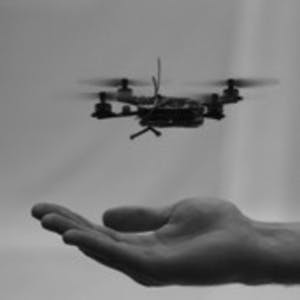The Introduction to Robotics Specialization offers a comprehensive exploration of the concepts and applications of robotics. Through a series of modules, participants will delve into the mechanics of flight, motion planning, computational perception, and estimation in robotics. The program culminates in a capstone project, allowing students to apply their knowledge to real-world challenges.
Key learning outcomes include:
Upon completion, participants will be equipped with the skills to program robots for a range of movements, from aerial operations to grasping objects, preparing them for diverse career opportunities in the field of robotics.
Certificate Available ✔
Get Started / More Info
The Robotics specialization comprises modules covering aerial robotics, computational motion planning, mobility, perception, estimation, and a capstone project. Participants will gain in-depth knowledge of each area, preparing them for the practical application of robotics principles.
How can agile micro aerial vehicles operate autonomously in cluttered environments? This module delves into the mechanics of flight, the design of quadrotor robots, and the challenges of using noisy sensors for localization. Students will develop dynamic models and controllers for operating in three-dimensional environments.
This course considers the problem of how a robot decides what to do to achieve its goals, known as Motion Planning. Students will learn common approaches to addressing this problem, including graph-based methods, randomized planners, and artificial potential fields. The module discusses the challenges that make planning difficult.
Participants will explore how robots can move in unstructured environments using their motors and sensors. The module covers the design of robot bodies and behaviors to confer reliable mobility, as well as the composition of simple dynamical abstractions to automate the generation of sensorimotor programs.
This module focuses on how robots perceive the world and their movements to accomplish navigation and manipulation tasks. Students will study how images and videos acquired by robots are transformed into representations for extracting 3D information about the environment and object posing.
Students will learn how robots estimate their state and properties of the environment from noisy sensor measurements. The module covers probabilistic generative models, Bayesian filtering for localization and mapping, and techniques for incorporating uncertainty into estimating and learning from a dynamic and changing world.
The Robotics Capstone provides an opportunity to implement a solution for a real-world problem based on the content learned in the specialization. Participants can choose from simulation or hardware tracks, demonstrating their programming skills in robot movement, planning, and perception for practical applications.
Electrodynamics is a comprehensive Specialization exploring the fundamental principles of electromagnetism and their applications to materials science, electrical...
This course delves deep into Maxwell's Equations, exploring wave equations, AC circuits, and their practical applications in various fields.
Introduction to FPGA Design for Embedded Systems provides a comprehensive understanding of FPGA technology, architecture, and design. Ideal for aspiring engineers...
This course provides in-depth training on design-oriented analysis techniques for switching power converters, focusing on the Extra Element Theorem and N-Extra Element...